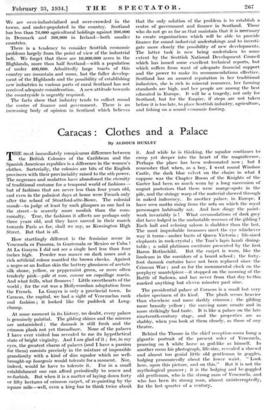Caracas : Clothes and a Palace
By ALDOUS HUXLEY
THE mcst immediately conspicuous difference between the British Colonies of the Caribbean and the Spanish American republics is a difference in the women's clothes. Sartorially, the colonies are bits of the English provinces with their provinciality raised to the nth power. The negresses and mulattos have abandoned the eternity of traditional costume for a temporal world of fashions—. but of fashions that are never less than four years old, and even in the palmiest days at home were French only after the school of Stratford-atte-Bowe. The colonial monde—to judge at least by such glimpses as one had in the street—is scarcely more modish than the com- monalty. True, the fashions it affects are perhaps only three years old, and they have moved in their march towards Paris as far, shall we say, as Kensington High Street. But that is all.
How startlingly different is the feminine scene in Venezuela or Panama, in Guatemala or Mexico or Cuba ! At La Guayra I did not see a single heel less than four inches high. Powder was mauve on dark noses and a rich artificial colour mantled the brown cheeks. Against a negro or an Indian skin the buttery glossiness of acetate silk shone, yellow, or peppermint green, or more often tenderly pink—pdk et rose, comme un coguillage marin. And what frills, what flounces ! Little sweethearts of the world ; for the cut was a Hollywoodian adaptation from the French. La Guayra is only a provincial town. In Caracas, the capital, we had a sight of Venezuelan rank and fashion ; it looked like the paddock at Long- champ.
At some moment in its history, no doubt, every palace is genuinely palatial. The gilding shines and the mirrors are untarnished ; the damask is still fresh and the crimson plush not yet threadbare. None of the palaces I have ever visited has revealed to me its hypothetical state of bright virginity. And I am glad of it ; for, in my eyes, the greatest charm of palaces (and I have a passion for them) consists precisely in the mixture of impossible grandiosity with a kind of dim squalor which no well- brought-up bourgeois would tolerate for a moment. Nor, indeed, would he have to tolerate it. For in a small establishment one can afford periodically to renew and re-furbish. But when it is a matter of laying down forty or fifty 'hectares of crimson carpet, of re-painting by the square mile—well, even a king has to think twice abotit it. And while he is thinking, the squalor continues to creep yet deeper into the heart of the magnificence.. Perhaps the place has been redecorated now ; but I remember that when, as a boy, I went round Windsor Castle, the dark blue velvet on the chairs in what I suppose was the Chapter Room of the Knights of the Garter had been so much worn by a long succession of august posteriors that there were mange-spots in the pile, and the stringy warp of the material showed through in naked indecency.. In another palace, in Europe, I have seen moths rising from the sofa on which the royal personages habitually sat. And how .dingy the paint- work invariably is . What accumulations_ of dark grey dirt have lodged in the undustable recesses of the gilding ! Each hall and echoing saloon is shabbier than the last. The most improbable treasures meet the eye whichever way it turns—amber busts of Queen Victoria ; life-sized elephants in rock-crystal ; the Tsar's lapis lazuli dining- table ; a solid platinum escritoire presented by the first Baron Rothschild. But the carpet is worn, like the linoleum in the corridors of a board school ; the forty, foot damask curtains have not been replaced since the Crimean War ; and as for the monumental clock on the porphyry mantelpiece—it stopped on the morning of the Battle of Sadowa, and has never from that day to this marked anything but eleven minutes past nine.
The presidential palace at Caracas is a small but very choice specimen of its kind. The plush seems heavier than elsewhere and more darkly crimson ; the gilding more brassily yellow ; the carving more ornate and in more strikingly bad taste. It is like a palace on the late nineteenth-century stage, and the properties are as. shabby, when you look at them closely, as those of any theatre.
Behind the Throne in the chief reception-room hung a gigantic portrait of the present ruler of Venezuela, prancing on fi white horse as god-like as himself. In another room his photograph, life-size, revealed a shrewd and almost too genial little old gentleman in goggles, bulging pronouncedly about the lower waist. " Look here, upon this picture, and on this." But it is not the mythological prancer ; it is the bulging and be-goggled old gentleman, who is the strong man of Venezuela, and who has been its strong man, almost uninterruptedly, for the last quarter of a century.
















































 Previous page
Previous page